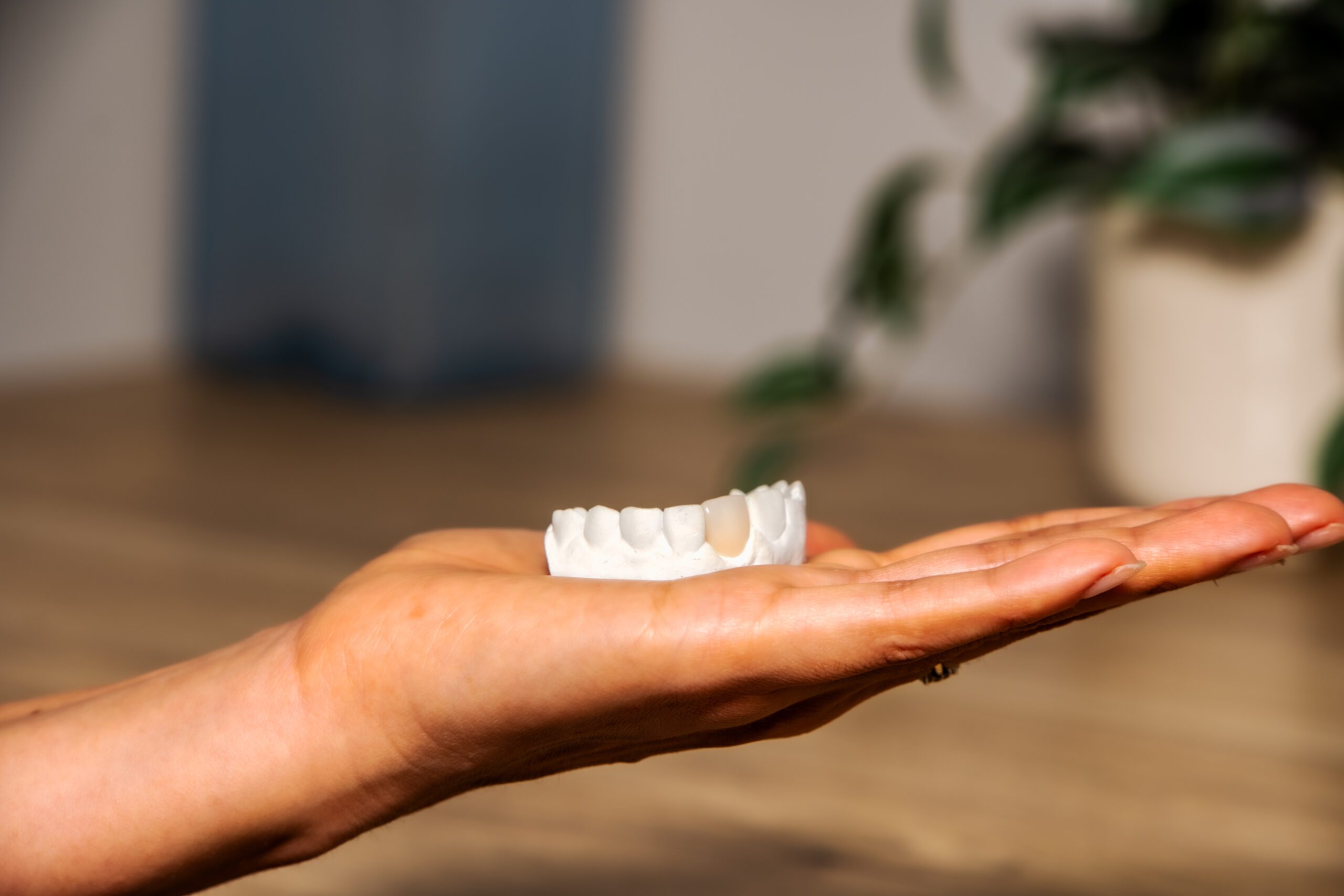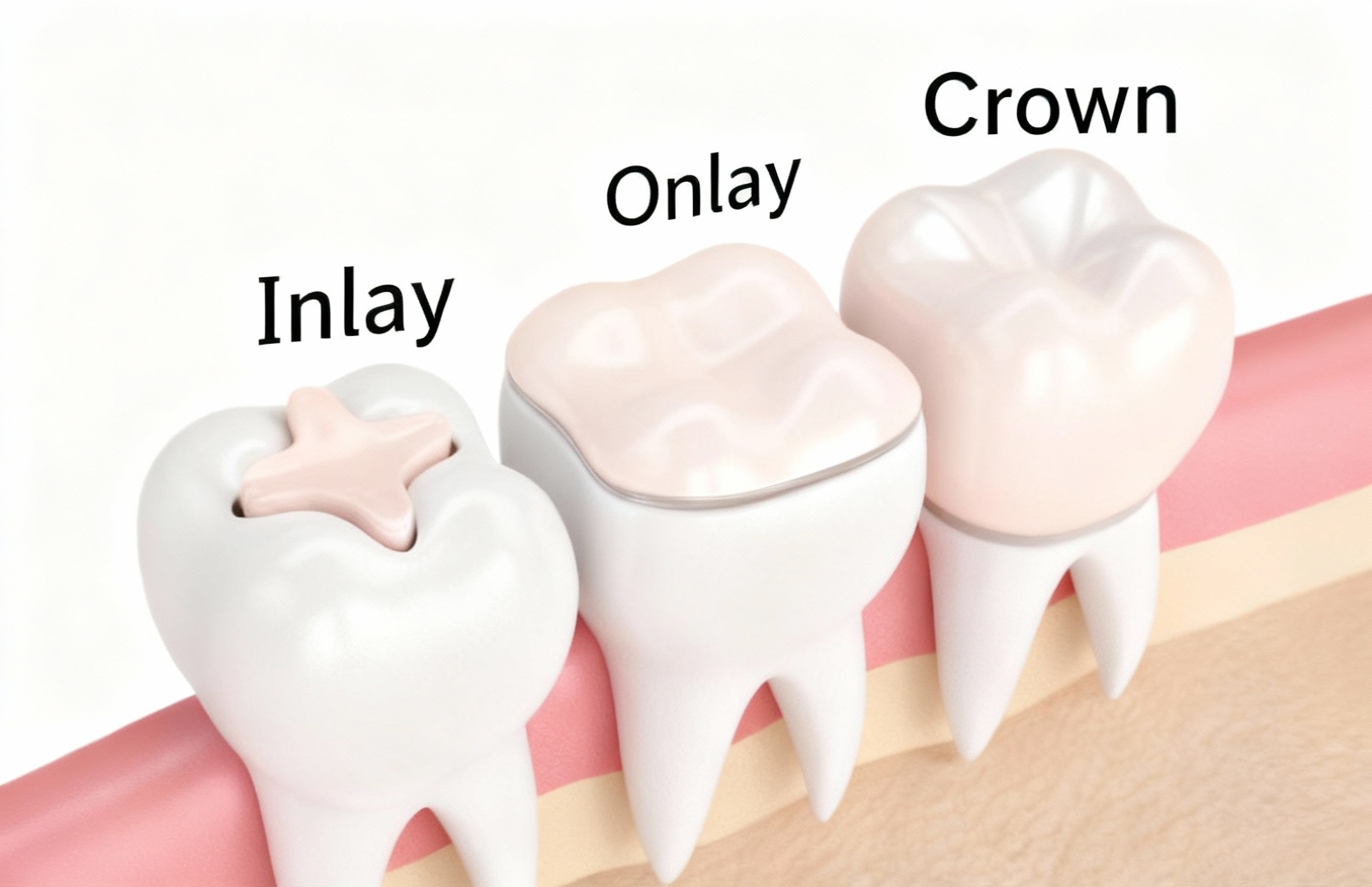Your teeth deserve protection that goes the distance. Our dental crowns act as a protective shield for weakened teeth, restoring both strength and beauty when damage runs deep—giving your natural tooth a second chance to serve you for years to come.

We believe everyone deserves teeth that can withstand life’s demands whilst maintaining their natural beauty. Our dental crown solutions combine advanced materials with expert craftsmanship to create comprehensive protection for severely compromised teeth. When tooth damage is too extensive for fillings, inlays, or onlays, dental crowns provide complete coverage that rebuilds both strength and function whilst preserving your natural bite.
Dental crowns are custom-made caps that completely cover the visible portion of a damaged tooth, acting like a protective shell that restores the tooth’s original shape, size, and strength. Unlike other restorations that cover only part of the tooth, crowns provide 360-degree protection for teeth that have been weakened by extensive decay, large fractures, or previous dental work. This comprehensive approach helps extend the life of your natural tooth whilst delivering superior durability and aesthetics that seamlessly blend with your smile.


Dental crowns have evolved significantly, combining advanced materials with precise digital craftsmanship to restore severely damaged teeth effectively. Today’s dental crowns offer advantages that make them one of the most comprehensive options for tooth restoration, delivering both exceptional durability and natural-looking aesthetics that surpass traditional restoration techniques.
Dental crowns provide 360-degree coverage for severely damaged teeth, offering comprehensive protection that helps prevent further fractures, decay, or structural breakdown of the underlying tooth.
Crowns rebuild the tooth's original shape and strength, allowing you to bite and chew comfortably without worry about damaging the weakened tooth or experiencing pain during eating.
Made from high-quality materials like porcelain, ceramic, or metal alloys, dental crowns are designed to withstand normal chewing forces and can last 10-15 years or longer with proper care.
Modern crown materials can be precisely matched to your natural tooth colour and translucency, creating restorations that blend seamlessly with your existing teeth for an undetectable appearance.
By completely covering and protecting the damaged tooth, crowns prevent bacteria from accessing vulnerable areas and stop the progression of decay or structural deterioration.
Dental crowns can address multiple issues including large cavities, cracked teeth, worn teeth, teeth after root canal treatment, and can serve as anchors for dental bridges when appropriate.
Getting dental crowns is a comprehensive process designed to restore your tooth’s strength, function, and appearance. Below is an overview of the procedure, and our FAQ section provides more detailed information to help you understand each step.










Discover the latest in restorative dentistry, inlays, onlays and dentures. From single-tooth crowns to comprehensive restorations and custom dentures, our articles provide expert guidance, treatment insights, and practical tips to help you restore a strong, natural-looking, and confident smile.

Thinking about getting a dental crown but wondering about the cost? Understanding what affects the price can make it easier to plan. Crowns are made to fix and protect teeth, but their price can change based on different things. Knowing what to expect helps you make a smart choice for your smile. Let’s explore the […]

In dentistry, inlays and onlays are a form of indirect restorations, which means they are made outside of the mouth as a single, solid piece that fits the specific size and shape of the cavity and then cemented in place in the tooth. This process generally takes two visits. Inlays lie inside the cavity of the tooth and do […]

Dental Crowns and Bridges are fixed device that are cemented onto existing teeth or dental implants. It extends the longevity of tooth in patient’s mouth and makes them stronger. Crowns (tooth cap) are commonly used for the following reasons: Cover a damaged tooth and restored a large filling where there is not enough bonding surface […]
Dental crowns are custom-made caps that completely cover the visible portion of a damaged tooth above the gum line. They restore the tooth’s shape, size, strength, and appearance whilst providing comprehensive protection for severely compromised teeth.
Crowns may be recommended for teeth with extensive decay, large fractures, severe wear, after root canal treatment, to support a dental bridge, or when a tooth is too damaged for other restorative options like fillings or inlays.
Common crown materials include porcelain, ceramic, porcelain-fused-to-metal, and metal alloys. Porcelain and ceramic crowns offer excellent aesthetics and can be matched to your natural tooth colour, whilst metal crowns provide exceptional durability.
With proper care and maintenance, dental crowns typically last 10-15 years or longer. Longevity depends on factors such as the material used, location in the mouth, oral hygiene habits, and individual bite forces.
The crown procedure is performed under local anaesthetic to ensure comfort during treatment. Some mild sensitivity or discomfort may occur following the procedure, which typically subsides within a few days.
The crown process typically requires two appointments: the first for tooth preparation and impressions, and the second for crown placement. Emergency appointments may be available if issues arise with the temporary crown.
Temporary crowns protect your prepared tooth between appointments but are not as strong as permanent crowns. Avoid sticky or hard foods, chew on the opposite side when possible, and contact us if the temporary crown becomes loose or uncomfortable.
Care for crowns like natural teeth with regular brushing, flossing, and professional cleanings. Avoid chewing ice or hard objects, and consider a nightguard if you grind your teeth to protect your investment.
Whilst the crown itself cannot decay, the tooth underneath can still develop cavities at the gum line or around the crown margin. Proper oral hygiene is essential to prevent decay around crowned teeth.
Some initial sensitivity or bite adjustment may be normal, but persistent discomfort should be evaluated. Contact our practice if you experience ongoing pain, sensitivity, or if the crown feels too high when biting.
Crowns cannot be whitened with traditional bleaching treatments as they’re made from materials that don’t respond to whitening agents. If you’re considering teeth whitening, it’s best done before crown placement for colour matching.
If your crown comes off, contact our practice immediately. Keep the crown safe and clean, avoid chewing on that side, and we’ll arrange prompt reattachment or replacement as needed.
Crown costs vary depending on the material chosen, case complexity, and individual requirements. We provide detailed treatment plans with transparent pricing and discuss payment options during your consultation.
Depending on the extent of damage, alternatives might include large fillings, inlays, onlays, or veneers. However, when significant tooth structure is compromised, crowns often provide the most comprehensive and durable solution.
Yes, once fully healed and adjusted, you should be able to eat normally with a dental crown. However, it’s wise to avoid extremely hard foods and habits like ice chewing or using teeth as tools to protect your restoration.